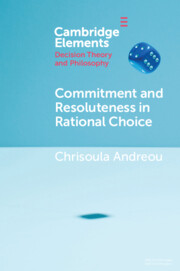References
Ainslie, G. (2001). Breakdown of Will. Cambridge: Cambridge University Press.
Andreou, C. (2006a). Environmental damage and the puzzle of the self-torturer. Philosophy & Public Affairs, 34(1), 95–108.
Andreou, C. (2006b). Might intentions be the only source of practical imperatives. Ethical Theory and Moral Practice, 9(3), 311–325.
Andreou, C. (2007a). Environmental preservation and second-order procrastination. Philosophy & Public Affairs, 35(3), 233–248.
Andreou, C. (2007b). Understanding procrastination. Journal for the Theory of Social Behaviour, 37(2), 183–193.
Andreou, C. (2008). Making a clean break: Addiction and Ulysses contracts. Bioethics, 22(1), 25–31.
Andreou, C. (2009). Taking on intentions. Ratio, 22(2), 157–169.
Andreou, C. (2010). Coping with procrastination. In The Thief of Time, ed. Andreou, C. and White, M. D.. New York: Oxford University Press, pp. 206–215.
Andreou, C. (2014a). The good, the bad, and the trivial. Philosophical Studies, 169(2), 209–225.
Andreou, C. (2014b). Temptation, resolutions, and regret. Inquiry, 57(3), 275–292.
Andreou, C. (2016). Figuring out how to proceed with evaluation after figuring out what matters. Dialogue: Canadian Philosophical Review, 55, 621–637.
Andreou, C. (2018a). Self-paternalism. In The Routledge Handbook of the Philosophy of Paternalism, eds. Grill, K. and Hanna, J.. New York: Routledge, pp. 59–65.
Andreou, C. (2018b). Newcomb’s problem, rationality, and restraint. In Newcomb’s Problem, ed. Ahmed, A.. Cambridge: Cambridge University Press, pp. 167–178.
Andreou, C. (2021). General assessments and attractive exceptions. Inquiry, 64(9), 892–900.
Anscombe, G. E. M. (1963). Intention. Cambridge, MA: Harvard University Press.
Bratman, M. (1987). Intention, Plans, and Practical Reason. Cambridge, MA: Harvard University Press.
Bratman, M. (2018). Planning, Time, and Self-Governance. New York: Oxford University Press.
Broome, J. (2001). Are intentions reasons? And how should we cope with incommensurable values? In Practical Rationality and Preference, eds. Morris, C. W. and Ripstein, A.. Cambridge: Cambridge University Press, pp. 98–120.
Davidson, D. (2001). Essays on Actions and Events. Oxford: Clarendon Press.
Davidson, D., McKinsey, J. C. C., and Suppes, P. (1955). Outlines of a formal theory of value, I. Philosophy of Science, 22(2), 140–160.
De Condorcet, N. (1785). Essay on the Application of Analysis to the Probability of Majority Decisions. Paris, De l’Imprimerie Royale.
Dresser, R. S. (1982). Ulysses and the psychiatrists. Harvard Civil Rights-Civil Liberties Law Review, 16(3), 777–854.
Dresser, R. S. (1984). Bound to treatment. Hastings Center Report, 14(3), 13–16.
Elster, J. (1984). Ulysses and the Sirens: Studies in Rationality and Irrationality. Cambridge: Cambridge University Press.
Elster, J. (2000). Ulysses Unbound. Cambridge: Cambridge University Press.
Ferrero, L. (2017). Intending, acting, and doing. Philosophical Explorations, 20(S2), S13–S39.
Gauthier, D. (1986). Morals by Agreement. Oxford: Clarendon Press.
Gauthier, D. (1991). Why contractarianism? In Contractarianism and Rational Choice, ed. Vallentyne, P.. Cambridge: Cambridge University Press, pp. 15–30.
Gauthier, D. (1994). Assure and threaten. Ethics, 104(4), 690–721.
Glover, J. (1975). It makes no difference whether or not I do it (I). Proceedings of the Aristotelian Society, Supplementary Volumes, 49(1), 171–190.
Gollwitzer, P. M. and Schaal, B. (1998). Metacognition in action: The importance of implementation intentions. Personality and Social Psychology Review, 2(2), 124–136.
Hardin, G. (1968). The tragedy of the commons. Science, 162(3859), 1243–1248.
Hobbes, T. (1668/1994). Leviathan. Indianapolis: Hackett.
Holton, R. (2009). Willing, Wanting, Waiting. Oxford: Clarendon Press.
Hume, D. (1951/1998). An Enquiry Concerning the Principles of Morals, ed. Beauchamp, T. L.. Oxford: Clarendon Press.
Kagan, S. (2011). Do I make a difference? Philosophy & Public Affairs, 39(2), 105–141.
Kavka, G. (1983). The toxin puzzle. Analysis, 43(1), 33–36.
McClennen, E. (1990). Rationality and Dynamic Choice. Cambridge: Cambridge University Press.
McClennen, E. (1998). Rationality and rules. In Modeling Rationality, Morality, and Evolution, ed. Danielson, P.. New York: Oxford University Press, pp. 13–40.
Olson, M. Jr. (1965). The Logic of Collective Action. Cambridge, MA: Harvard University Press.
Parfit, D. (1984). Reasons and Persons. Oxford: Oxford University Press.
Peterson, M. (2015). The Prisoner’s Dilemma. Cambridge: Cambridge University Press.
Quante, M. (1999). Precedent autonomy and personal identity. Kennedy Institute of Ethics Journal, 9(4), 365–381.
Quinn, W. (1993). The puzzle of the self-torturer. In Morality and Action, ed. Foot, Philippa. Cambridge: Cambridge University Press, pp. 198–209.
Rawls, J. (1971). A Theory of Justice. Cambridge, MA: Harvard University Press.
Savulescu, J. and Dickenson, D. (1998). The time frame of preferences, dispositions, and the validity of advance directives for the mentally ill. Philosophy, Psychiatry, and Psychology, 5(3), 225–246.
Schelling, T. C. (1984). Ethics, law, and the exercise of self-command. In Choice and Consequence. London: Harvard University Press, pp. 83–112.
Spellecy, R. (2003). Reviving Ulysses contracts. Kennedy Institute of Ethics Journal, 13(4), 373–392.
Temkin, L. S. (2012). Rethinking the Good. Oxford: Oxford University Press.
Tenenbaum, S. (2020). Rational Powers in Action. New York: Oxford University Press.
Tenenbaum, S. and Raffman, D. (2012). Vague projects and the puzzle of the self-torturer. Ethics, 123(1), 86–112.
Thoma, J. (2018). Temptation and preference-based instrumental rationality. In Self-Control, Rationality, and Decision Theory, ed. Bermúdez, J. L.. Cambridge: Cambridge University Press, pp. 27–47.
Thompson, M. (2008). Life and Action. Cambridge, MA: Harvard University Press.
Vanderschraaf, P. (2006). The circumstances of justice. Politics, Philosophy & Economics, 5(3), 321–351.
Velleman, J. D. (2000). Deciding how to decide. In The Possibility of Practical Reason. Oxford: Oxford University Press, pp. 221–243.


